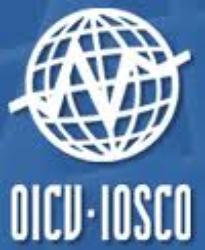The International Organization of Securities Commissions - IOSCO published a report on 12 June to regulate oil markets.
http://www.thejournalofregulation.com/spip.php?article1507

The real economy is entirely financiarized, it is the same for the oil economy. This is why the G20 has asked to the "Organisation internationale des commissions de valeurs" - OICV (International Organization of Securities Commissions) to reflect back on how oil markets could be regulated, what they are currently not, because the market remains an over-the-counter market. Financial regulators, in a report published on June 12, 2012, suggest that at least the information be controlled, fluctuations in the price of a barrel are reviewed and the functions of "the information agencies," should be inspected, but also the role of traders that communicate them information. Regulation, so shy it is, starts with information. On the matter of oil, transparency is not expected and geopolitics often excludes it.
© thejournalofregulation
The energy sector is one of those which are the most financiarized, which causes problems particularly complex in regulation, particularly because the financial regulator wants to regulate the underlying energetic, while the energy regulator can regulate financial derivatives.
The legal battle between regulators could be observed in the United States. On the merits, the financial authorities and the States now intertwined in the regulation of financial markets and the banking regulation can no longer bear the absence of regulation of energy markets.
However, the oil markets are not regulated. It was therefore logical that the G-20, that is to say a political and international body, requires thought about this point, as it was logical that this request is addressed to the world association of financial regulators.
But on the merits, what do we do? Indeed, if we suspected market manipulations, for the moment only agreement that the" Organisation des pays exportateurs de pétrole"- OPEP (the Organization of the Petroleum Exporting Countries) could remedy them, which is a sword of Damocles for clients, and competition law is naturally upset.
We cannot consider establishing a regulator independent of States, and global, in this matter. It would be dream of child. Therefore, in its report on June 12, 2012, The "Organisation internationale des commissions de valeurs" - OICV (International Organization of Securities Commissions) rely on the information, first step of the regulation, or second-best solution, following the way that half-full glasses can be analysed. Indeed, traders provide information, those they choose to give, to "rating agencies", which analyse them and disclose the studies that they make.
The "Organisation internationale des commissions de valeurs "- OICV (International Organization of Securities Commissions) suggests that we control the choice that traders operate in the information in a better way, handling at the base. Then, second possible handling, the "Organisation internationale des commissions de valeurs" - OICV (International Organization of Securities Commissions) finds that these "agencies of information" which thus provide information on market prices of oil markets, physical and future, are mainly two and are private operators.
The market is therefore duopolistic and the raised eyebrows made about to rating agencies might be imitated for this reason. Finally, there has been in this recent year significant fluctuations of prices, which are not explained.
Therefore, we can think that there are price manipulations. But as the market is not yet organized, it is impossible to react and it is worth reflecting back on how we might move from over the counter market an organized market, since there is a mechanism market price. Pragmatically, the "Organisation internationale des commissions de valeurs" - OICV (International Organization of Securities Commissions) is not considering creating an independent public regulator.
We resume here the idea currently widespread of internationalization of the regulation, the Organization suggests that information agencies create within themselves commissions of independent control and organized themselves audits. We measure here stronger points of contact, In the absence of any more perhaps, between regulation and compliance, this one being the regulation internalized in economic operators themselves.

your comment